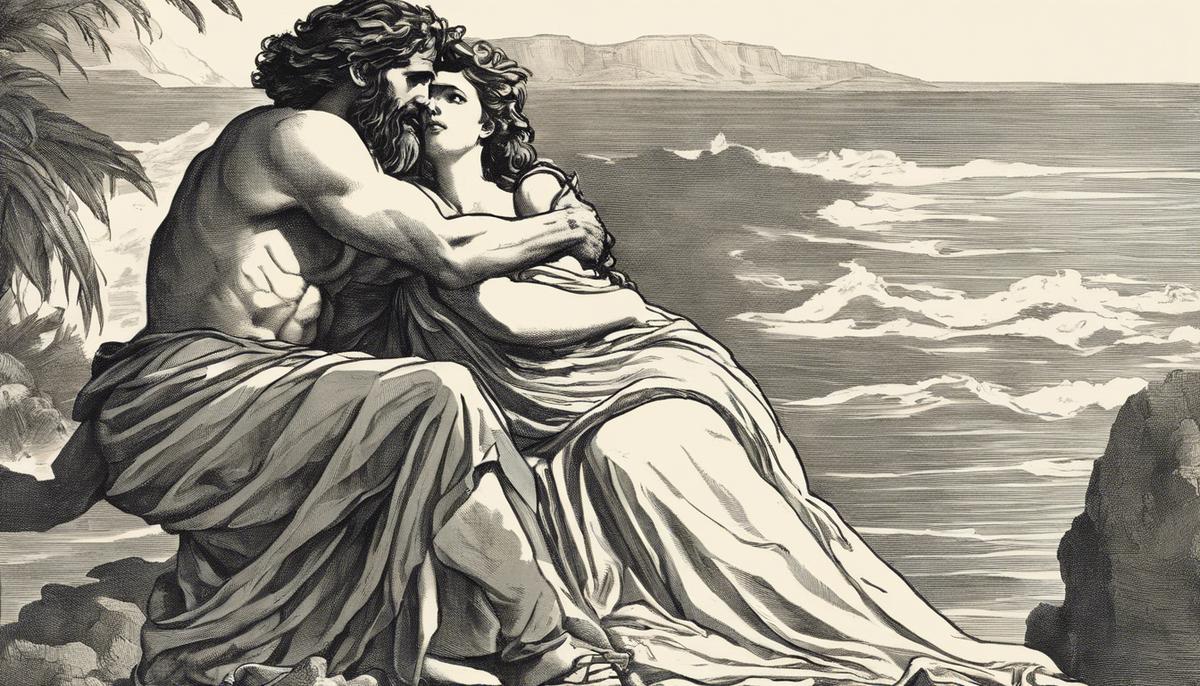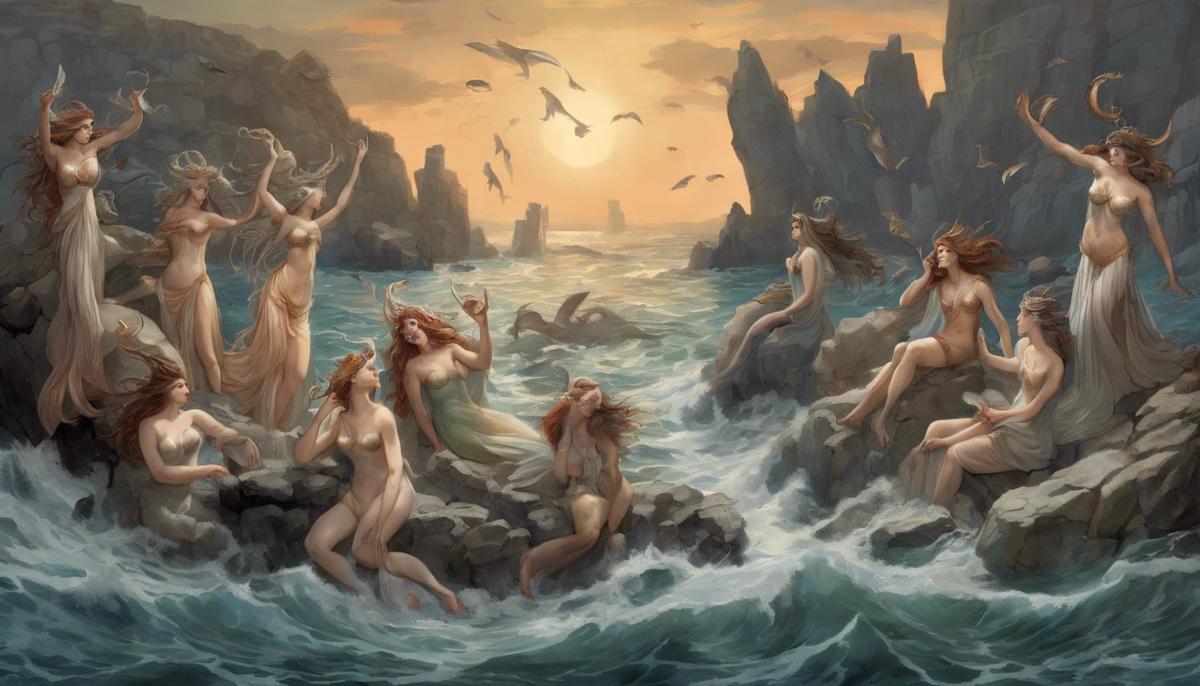Calypso's Origins and Identity
Calypso's family tree is as tangled as a sailor's knots. In the captivating world of Greek mythology, it seems like every storyteller wanted to leave their mark on her origins. Let's try to untangle the myths and figure out who Calypso really is.
Homer, the legendary Greek epic poet, portrays Calypso as a nymph with an impressive pedigree. She's called the daughter of Atlas—the Titan condemned to hold up the sky. Homer's stories place her squarely on the island of Ogygia, drawing us into her solitary existence surrounded by nature.
Then there's Hesiod, another ancient literary giant, who throws a different name into the mix. He asserts that Calypso is descended from Tethys and Oceanus, making her a member of the Oceanids. This gives her the aura of an underwater goddess, doesn't it?
But wait, there's more! Apollodorus takes a different approach, presenting Calypso as a Nereid, born to Nereus and Doris. This connects her even more closely to Poseidon's aquatic realm, adding another layer to the story.
Here's the twist, though—these might not even be the same Calypsos! Imagine that! Different tales possibly intertwining around multiple enchantresses sharing the same name. It's like that awkward moment when two people show up to a party wearing identical outfits.
Each version depicts Calypso as deeply connected to nature, but they vary on her exact place in the divine hierarchy. Is she the lonely lover of heroes, isolated on an island? Or a poignant representation of ancient worldviews where love and power intertwine in profound ways? The inconsistency in her origin stories might make us feel like we're caught in a whirlpool, trying to reconcile her identity.
Despite this mythological confusion, all the stories revolve around her iconic encounter with Odysseus—the wandering hero who transformed her island paradise into a love nest or a prison, depending on the narrator. Navigating through her tales not only reveals her enigmatic allure but also offers insight into the complexity of human (and divine) emotions. Perhaps the variations in her origin stories are the ancient storytellers' way of emphasizing her mystery and charm, allowing her to elude straightforward categorization. This ever-changing narrative leaves us pondering how much our roots define our destiny or actions, whether we're surrounded by oceans or grapevines.
Moreover, consider this: our heroine Calypso still manages to capture hearts and inspire songs with her signature blend of intrigue and attraction. A glamorous beacon who, despite a jumble of origin stories, forges an undeniably unique identity that is both ethereal and eternal.
Calypso and Odysseus: A Tale of Love and Captivity
Let's pause for a moment on the shores of Ogygia, Calypso's not-so-vacation-friendly island home. Calypso, the goddess of captivating love stories, offered stranded sailors more than just basic necessities—she provided luxurious accommodations in what you might call a love ambush!
Picture this: Odysseus, our heroic heartthrob, washed ashore, only to be rescued by Calypso, whose beauty and voice could give Aphrodite and Adele a run for their money. In such a scenario, one might beg, "Please don't make me leave!" Yet, the thread connecting this lovely scene is the complicated interplay of divine love and mortal responsibility.
Calypso offered more than just a magical getaway; she threw immortality into the deal. "Stay with me and forget about aging!" Quite the retirement package, right? But this gift presented an emotional dilemma for Odysseus, highlighting the eternal struggle between love and duty. As tempting as an eternal vacation sounds, knowingly settling on idyllic but isolated shores could turn even paradise bittersweet—where bliss might feel more like endless misery.
For years (almost defining the long-term "It's complicated" status on celestial social media), Odysseus lived under the gentle grip of love, without physical chains but bound by loyalty to his faraway wife, Penelope. This raises a complex moral quandary: the anguish of betrayal balanced against the allure of divine charms. This passionate captivity elevated the simple emotional question of "Should I stay or should I go?" to epic ethical proportions!
But every party has a pooper, and in this case, it's the Olympian higher-ups who turn the tables. At this point, let's spare a little sympathy for our nymph. When Athena and Zeus decreed that Odysseus must be allowed to pack his bags and head home, it wasn't just about throwing thunderbolts around—it represented divine intervention in an immortal's desires. Calypso, though a goddess, faced something remarkably human—unrequited love. She recognized the unfair scripts that gods could rewrite, where relationships between goddesses and nymphs were destined for tragic endings.
Yielding to the divine decree, Calypso not only granted Odysseus his freedom but also equipped him thoroughly for his journey—wood for a raft, wine for his stores, and some godly snacks for the road. Here lies the unspoken grace of the storyteller's art—transforming what could be seen as divine coercion into a display of empowerment and bittersweet love.
Did Calypso simply wait around until another castaway caught her eye? Perhaps we could interpret her stony silence as an ancient echo of a broken but still beating immortal heart. The tale becomes a timeless symbol of longing, captivity cradling freedom, and the enduring human spirit gracefully navigating the veiled winds of fate.
Embraced by vines and whispers of ancient passion, Odysseus and Calypso are immortalized in mythology—a story where love's hold is both sweetly binding and painfully bitter!

The Symbolism of Calypso in Modern Context
Calypso's impact extends beyond the realm of ancient myths; she sails smoothly into modern consciousness, her influence evident in contemporary literature and culture. Her enduring appeal takes on new forms—as muse, symbol, and enigmatic presence—in our quest to understand the dimensions of love, freedom, and the elusive essence of femininity.
Modern interpretations peel back the layers of the myth to reveal Calypso not merely as a captor or lover, but as the embodiment of the boundless power of love that both entraps and frees. Films with sea-themed adventures, literature rich with allegories, and even song lyrics pulsing with passion pay homage to her. In movies, she morphs into characters embodying enchantment and otherworldly allure, weaving through storylines like an invisible tapestry of temptation and attraction.
Calypso also provides a fresh lens for examining female autonomy and power dynamics in relationships. Her story with Odysseus is reexamined through the prism of 21st-century ideas about gender roles and constructs. Some suggest that Calypso represents what society often labels as the "eternal feminine"—mysterious, nurturing, yet confining. This role invites discussions about how women's emotional labor and sacrifices in love are frequently romanticized, yet painfully restrictive.
Furthermore, her island, once merely her secluded domain in mythology, has evolved into a broader metaphor for the personal islands we metaphorically strand ourselves on due to love or fear. Calypso's realm resonates with the islands of isolation or protection we create around our emotional selves, the islets we populate with bittersweet memories, perched on the crests of which we await our own rescues or releases.
Her character becomes an allegory for themes of liberation struggles against the bonds of societal expectations. It sends a compelling message that perhaps in her celestial watch over the heartstrings of her captive lies the key to understanding the tempest of personal freedom—our inherent right to orchestrate storms from the thrones of our emotional realms.
Indeed, spanning eras from the days of the Odyssey to the nights of social media, Calypso's enchantment evolves from robust myth to nuanced narratives—her story fragmented and rewoven into new discourses. Her voice, once an alluring snare, crystallizes as an echo amidst contemporary choruses debating feminism, empowerment, and the exhilarating terror of true autonomy.
Whether viewed as a damsel wielding inexplicable power or seen at the spectral edges of a brokenhearted enchantress, Calypso's tale is written as a commentary on the silken and iron shackles of devotion—ensuring she'll continue to surface in currents of cultural discourse. In this timeless dance across story-seas, she manages to reflect our shadows back at us as both the captive and captor of love.
Calypso's Legacy and Mythological Impact
As we explore the mythical depths, the ripples Calypso has created across ancient and modern narratives are truly remarkable in their intricacy and scope. A beacon in both romance and entrapment, she casts long shadows and illuminates paths in Western storytelling, subtly influencing its course like the ships she once lured to her shores.
Calypso's narrative ties her to a pattern that resonates throughout Greek mythology: gods and goddesses intervening in human destiny, entangled in affairs both heavenly and earthly, imbued with a flavor that is either more effervescent or sinister, depending on one's perspective. Her story establishes a precedent where other nymphs and female deities emerge, adding complexity to the literary tapestry that encompasses romantic tragedy intertwined with celestial threads.
Her prolonged confinement of Odysseus presents an archetype that shapes later tales of star-crossed lovers and tragic heroes ensnared either by others or by their own quests. This motif finds echoes in stories like that of Jason and Medea, where another powerful female employs her charms for love's sake, only for betrayal to douse their passion.
Moreover, Calypso's influence isn't limited to trapping heroes. Consider the role of the Sirens in "The Odyssey," whose perilous songs, almost themed after Calypso's veiled desires, lure sailors to their doom, portraying another facet of the intricate interplay between mortal pursuits and divine caprices. The character of Circe also carries a trace of Calypso's essence, blending enchantment with isolation, thereby transforming Odysseus and his men proactively rather than concealing them passively under her veil of love.
In propelling tales forward, Calypso provides a framework for contemplating the implications of alluring facades masking treacherous promises, a necessary map for navigating the myriad folds of Greek sagas. For nymphs and female deities, her legacy opens up arid landscapes where authority intertwines with allure, pointing fingers at the double standards applied to these beings. While male gods frequently meddled without much censure, Calypso is firmly reprimanded, mirroring broader paradigms set for divine women versus men.
Her thematic exile also shaped the hearts of poets and playwrights beyond Greek shores—dissolving into pens dripping with Western literary essence. We see shades of this narrative woven into Shakespeare's "The Tempest," where Prospero's mirroring isolation and control over the ethereal Ariel and the desperate Caliban resonate with undertones echoing Calypso's interactions.
The figurative hands of Calypso, then, have reached deep into the clay of Western imagination, molding scenes and sculpting contours wherein women of mythic proportions influence the tidal forces of narrative arcs. Much like erosion shapes cliffs or wind scatters across time's face—sporadic yet undeniably integral.
Yet through every tale shaped and riddled by her influence, through the ebb and flow of admiration for her encapsulated longings and marooned grief—the myths continually remind us of the intricate tapestries woven by invoking character threads as poignant as Calypso's. An island in the stream of Greek literature and immortal theatrical woe; veiled in verdure, shrouded in shadow, shining as a supernova at heart—a complex character bridging what it means to be divinely empowered and humanly trapped, heralding storms and reflectors blinking across the tides of story seas. Indeed, it's this enchanted pull—tightly coiled around tendrils of mythical narrative and literary lineage—that sustains Calypso both as an anchor and a beacon in the hauntingly beautiful panorama of Greek mythology.

- Homer. The Odyssey. Translated by Emily Wilson, W. W. Norton & Company, 2017.
- Hesiod. Theogony. Translated by Glenn W. Most, Loeb Classical Library, 2007.
- Apollodorus. The Library of Greek Mythology. Translated by Robin Hard, Oxford University Press, 1998.
- Graves R. The Greek Myths. Penguin Books, 1992.
- Morford MPO, Lenardon RJ, Sham M. Classical Mythology. 10th ed. Oxford University Press, 2014.

Leave a Reply